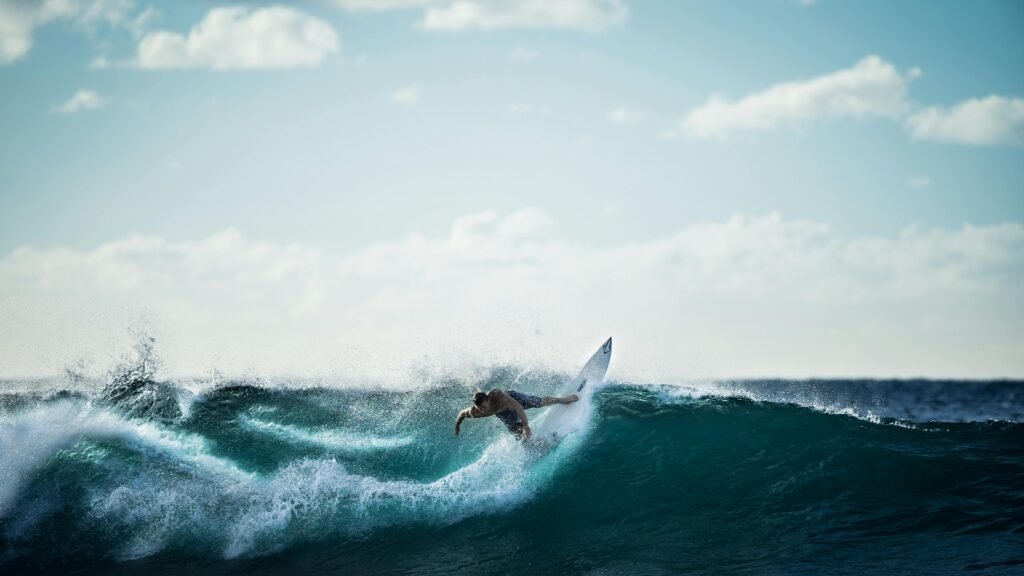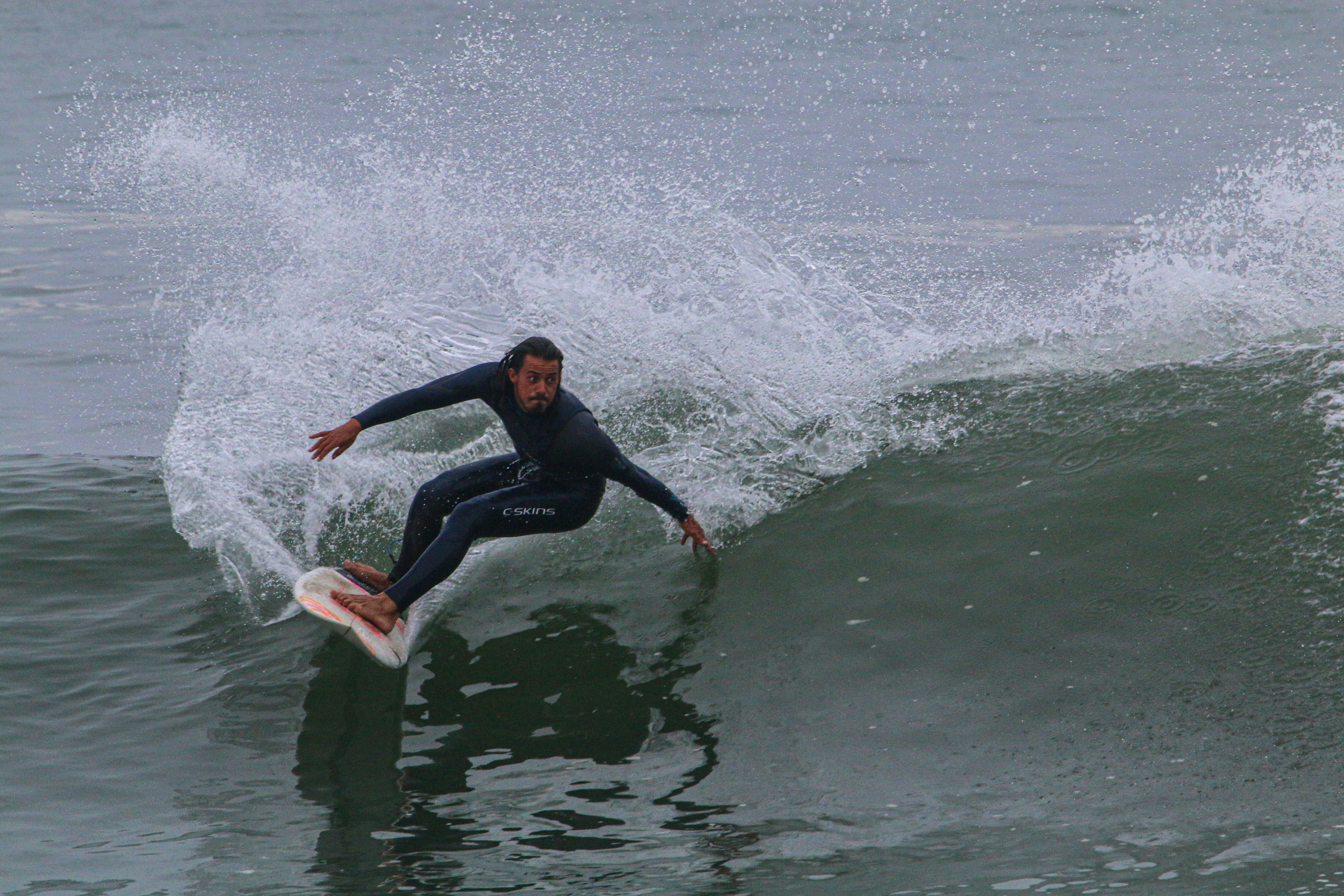The Physical Challenges of Surfing
Surfing is an exhilarating sport that demands a high level of physical fitness and skill. The physical challenges encountered by surfers can be both rigorous and multifaceted, emphasizing the need for strength, endurance, balance, and flexibility. Surfers must possess core strength to maintain stability on a moving board while navigating the unpredictable waves. The upper body strength is crucial for paddling out to the surf line and for powerful pop-ups to stand on the board. Moreover, leg strength supports the balance required to ride waves effectively, as well as to adjust posture in response to the shifting dynamics of the ocean.
Endurance plays a significant role in surfing as well, as surfers often find themselves battling against tides and currents for extended periods. This demand for sustained energy requires a solid training regimen focused on cardiovascular fitness. Furthermore, balance is not only essential for maintaining the stance on the board but also for making quick adjustments as one surfs. Combining these elements, surfers develop a unique blend of physical attributes tailored specifically to the sport.
However, the physical demands of surfing are accompanied by risks, including injuries such as sprains, fractures, and other accidents that can arise from falls or collisions. Sea-related hazards, including rip currents and rocky formations, also pose threats to an athlete’s safety. To mitigate these risks and enhance performance, surfers must engage in proper training and preparation. This includes flexibility workouts to increase range of motion, balance exercises to improve stability, and strength training to build the muscle necessary for tackling various surf conditions. Being adequately prepared helps minimize injuries and allows surfers to enjoy the thrilling experience of riding the waves more safely.

Environmental and Ecological Concerns
Surfing, while often celebrated for its exhilarating connection with nature, also presents various environmental challenges that must be critically examined. The birth of surf culture has led to significant impacts on marine ecosystems and coastal environments. One of the primary concerns is pollution. Surf spots often become littered with trash from tourists and surfers alike, including plastic, glass, and other debris that can harm marine life. This pollution can lead to serious issues for aquatic animals, as ingestion of foreign materials can be fatal or lead to long-term health problems within these species.
Moreover, the construction of surf-related infrastructure, such as resorts and surf shops, frequently contributes to habitat destruction. Coastal development often disrupts natural landscapes, leading to erosion and loss of biodiversity. Coral reefs, essential to marine health, are particularly vulnerable as they can be damaged by sediment runoff and water quality deterioration caused by land-based activities. Increased surf tourism can exacerbate these issues as more people flock to popular surf locations, placing additional strain on fragile ecosystems.
However, there are promising conservation efforts underway aimed at mitigating these negative impacts. Many surfers are increasingly aware of their footprint and are engaging in eco-friendly practices. Initiatives such as surf clean-ups and advocacy for stricter regulations on coastal development have gained traction within the surf community. Additionally, organizations dedicated to marine conservation work diligently to protect vulnerable habitats and promote sustainable practices. By actively participating in these initiatives, surfers can play a crucial role in preserving our oceans and promoting environmental awareness. The relationship between surfing and environmental stewardship is vital to ensuring that both the sport and our natural ecosystems continue to thrive for future generations.

Cultural Criticisms Within the Surf Community
The sport of surfing is deeply intertwined with cultural and historical roots, particularly from indigenous communities whose traditions have shaped the practice. In recent years, there has been growing criticism regarding cultural appropriation within the surf community. Critics argue that many surfers, particularly those from outside indigenous cultures, engage in practices that commercialize what has been a spiritual and community-oriented activity for its original practitioners. This raises ethical concerns about who has the right to participate in, and profit from, what is often perceived as a sacred cultural experience.
Commercialization has played a significant role in the evolution of surfing as a global sport, often leading to a dilution of its cultural significance. The prevalence of brand sponsorships and the commodification of surfing gear can overshadow its intrinsic value and historical importance. High-profile surfing competitions and events often emphasize entertainment and branding over respect for traditional practices and local customs, thus perpetuating a disconnect between surfing as a sport and its rich cultural heritage.
Furthermore, the surfing community has faced criticism for its lack of inclusivity and representation. The underrepresentation of marginalized voices in surfing, particularly women and people of color, highlights systemic issues within the community. Efforts to address these shortcomings are essential to fostering an environment that values diversity and promotes equal opportunities for all surfers. By encouraging representations that reflect the community’s cultural mosaic, the surfing world can create a more inclusive atmosphere where everyone’s voice is heard.
In navigating these challenges, it is crucial for surfers to acknowledge the cultural foundations of the sport and strive for inclusivity, ensuring that surfing continues to respect and celebrate its diverse heritage.

Mental and Emotional Challenges Faced by Surfers
Surfing, while often celebrated for its exhilaration and connection to nature, also presents numerous mental and emotional challenges for practitioners. One significant hurdle is the pressure to perform, which can be particularly intense in competitive surfing environments. Surfers frequently find themselves grappling with expectations from peers, coaches, and themselves, leading to stress and anxiety. The heightened competition can cultivate a fear of failure, which may detract from the joy that surfing once offered. Such pressure can be overwhelming, especially when coupled with the physical demands of the sport.
In addition to performance anxiety, many surfers confront fear and uncertainty when navigating larger waves or unfamiliar conditions. The reality of big wave surfing entails not only physical risks but also substantial mental fortitude. Surfers may experience acute anxiety or even panic in challenging situations, impacting their ability to surf effectively. This emotional distress can manifest in various ways, including avoidance of certain conditions or a diminishing sense of self-efficacy.
However, the relationship between surfing and mental health is multifaceted. While challenges abound, many surfers report therapeutic benefits that contribute positively to their emotional well-being. Surfing often acts as a form of mindfulness practice, allowing individuals to immerse themselves in the present moment, reduce stress and anxiety, and cultivate a sense of calm through the rhythmic movement of the water. Additionally, the supportive surf community plays a critical role in promoting mental health. Engaging with like-minded individuals fosters a sense of belonging and shared purpose, enabling surfers to navigate their challenges collectively.
To address the psychological demands of surfing, many practitioners employ coping strategies that enhance emotional resilience. Mindfulness techniques, such as meditation and focused breathing, can be integrated into pre- and post-surf routines. Personal development through setting realistic goals and celebrating progress can alleviate the burden of high expectations. Ultimately, by acknowledging both the challenges and benefits, surfers can cultivate a healthier relationship with the sport, enhancing their overall mental wellness.





Leave a Reply